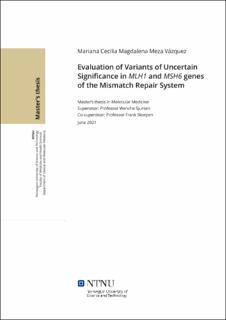| dc.contributor.advisor | Supervisor: Sjursen, Wenche | |
| dc.contributor.advisor | Co-Supervisor: Skorpen, Frank | |
| dc.contributor.author | Meza Vázquez, Mariana Cecilia Magdalena | |
| dc.date.accessioned | 2021-09-25T16:35:02Z | |
| dc.date.available | 2021-09-25T16:35:02Z | |
| dc.date.issued | 2021 | |
| dc.identifier | no.ntnu:inspera:77744542:46776436 | |
| dc.identifier.uri | https://hdl.handle.net/11250/2783316 | |
| dc.description.abstract | Tykktarmskreft (CRC) er en av de vanligste kreftformene både over hele verden og i Norge. Mutasjoner med høy penetrasjon fører til predisponering for kolorektal kreft, som omfatter opptil 5% av alle tilfeller av kolorektal kreft, f.eks. Mangler i DNA-mismatch (MMR) gener som forårsaker Lynch syndrom. Varianter i MMR-gener er klassifisert i fem klasser, hvorav klasse tre varianter heter Varianter av usikker klinisk signifikans (VUS). VUS kan ikke brukes til å diagnostisere en pasient med Lynch syndrom, siden det er usikkert om de påvirker riktig funksjon av MMR-systemet. . Databaser og prediksjonsverktøy samt klassifiseringssystemene som er utviklet over tid har vært veldig nyttige for å gi en bedre forståelse av mulige effekter som VUS-varianter kan forårsake.
For å verifisere og gi et avgjørende svar om patogenisiteten til MMR VUS-varianter, er forskjellige funksjonelle analyser utviklet. Disse analysene inkluderer cellefrie systemanalyser, funksjonelle analyser ved bruk av humane cellelinjer og gjærfunksjonsanalyser.
Hensikten med denne masteroppgaven var å klassifisere VUS-varianter i MLH1- og MSH6-gener i MMR-systemet som ble funnet på St. Olav’s Hospital. Videre mål var å lage en oversikt over forskjellige typer funksjonelle analyser fra eksisterende litteratur som har blitt brukt til å evaluere effekten av MMR-varianter, og til slutt velge en eller to av disse funksjonelle analysene for å etablere dem i laboratoriet.
Resultatene fra VUS Variant-klassifiseringen identifiserte 12 varianter med stor sannsynlighet for patogenisitet. Innenfor disse patogene variantene ble 6 identifisert i MLH1-genet og 6 i MSH6-genet. Det ble konkludert med at disse mulige patogene varianter kunne påvirke MMR-reparasjonskapasiteten som et helhetskompleks. Derfor ble funksjonelle analyser som vurderer MMR-kapasiteten gjennomgått og prioritert. Fra disse analysene ble det diskutert hvilke som kunne være de beste analysene for å evaluere VUS-variantene. Det ble konkludert med at den beste analysen for å evaluere de mest sannsynlig patogene varianter som ble funnet var CIMRA-metoden. | |
| dc.description.abstract | Colorectal cancer (CRC) is one of the most common types of cancer both worldwide and in Norway. High-penetrance mutations lead to predisposition to colorectal cancer, comprising up to 5% of all colorectal cancer cases, e.g., defects in the DNA mismatch (MMR) genes causing Lynch syndrome. Variants in the MMR genes are classified into five classes, whereof the class three variants are named Variants of Uncertain Clinical Significance (VUS). VUSes cannot be used to diagnose a patient with Lynch syndrome, since it is uncertain whether they affect the proper function of the MMR system. . Databases and prediction tools as well as the classification systems that have been developed over time have been very useful to provide a better understanding of the possible effects that VUS variants could cause.
To verify and give a conclusive answer about the pathogenicity of MMR VUS variants, different functional assays have been developed. These assays include cell-free system assays, functional assays using human cell lines and yeast function assays.
The purpose for this master’s thesis was to classify VUS Variants in MLH1 and MSH6 genes of the MMR system that were found at St. Olav’s Hospital. Further aim was to make an overview of different types of functional assays from existing literature that has been used to evaluate the effect of MMR variants, and to eventually select one or two of these functional assays to establish them in the laboratory.
The results from the VUS Variant classification identified 12 variants with a high probability of pathogenicity. Within these pathogenic variants 6 were identified in the MLH1 gene and 6 in MSH6 gene. It was concluded that these possible pathogenic variants could affect the MMR repair capacity as a whole process complex. Therefore, functional assays that evaluate the MMR capacity were reviewed and prioritized. From these assays it was discussed which ones could be the best assays to evaluate the VUS variants. It was concluded that the best assay to evaluate the most probably pathogenic variants found was the CIMRA method. | |
| dc.language | eng | |
| dc.publisher | NTNU | |
| dc.title | Evaluation of Variants of Uncertain Significance in MLH1 and MSH6 genes of the Mismatch Repair System | |
| dc.type | Master thesis | |
